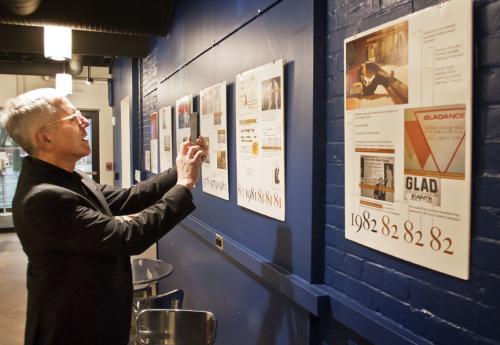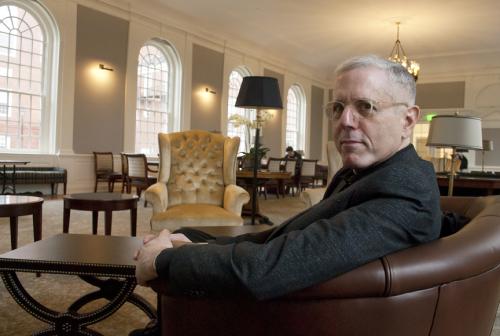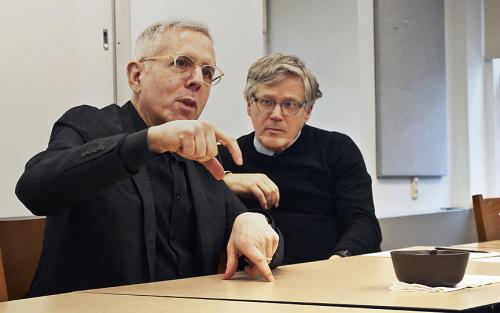By Timothy Cahill ’16 M.A.R.
The annals of Yale Divinity School record a long list of alumni who used their degrees to change the world and, at times, even make history. A shorter roster, but in its way equally impressive, records the names of those who changed Yale’s own history while still students. As an early activist for LGBTQ rights, David Wertheimer ’84 M.Div. is among this select group.
 In the early 1980s, Wertheimer led the call for Yale to recognize and protect what were then called “gay rights.” He was a leader of the student group (which also included David Norgard, ’83 M.Div.) that founded the Gay and Lesbian Cooperative (Co-op) and launched GLAD—Gay and Lesbian Awareness Days, the precursor of Yale’s “Pride” observances. Wertheimer spearheaded the campaign to have sexual orientation included in Yale’s nondiscrimination clause, facing off with Yale President A. Bartlett Giamatti in a brilliantly staged public meeting. He equally challenged the status quo at the Divinity School, leading the School’s “Gay/Straight Coalition” and butting heads with then-YDS Dean Leander E. Keck.
In the early 1980s, Wertheimer led the call for Yale to recognize and protect what were then called “gay rights.” He was a leader of the student group (which also included David Norgard, ’83 M.Div.) that founded the Gay and Lesbian Cooperative (Co-op) and launched GLAD—Gay and Lesbian Awareness Days, the precursor of Yale’s “Pride” observances. Wertheimer spearheaded the campaign to have sexual orientation included in Yale’s nondiscrimination clause, facing off with Yale President A. Bartlett Giamatti in a brilliantly staged public meeting. He equally challenged the status quo at the Divinity School, leading the School’s “Gay/Straight Coalition” and butting heads with then-YDS Dean Leander E. Keck.
And when he wasn’t advocating for LGBTQ justice, Wertheimer also made national news as part of the “Groton 11,” a group of Divvies arrested for protesting a nuclear submarine.
Today, Wertheimer is a Director at the Bill and Melinda Gates Foundation, the world’s wealthiest philanthropic advocate for global health, education and equality. The arc of his life after Yale includes running a New York nonprofit opposing homophobic violence, advocating for homeless families and abuse victims, and developing government services for people suffering from mental illness and substance abuse. During a visit to YDS in March, Wertheimer credited his years as a divinity student as the foundation of his lifelong battle against prejudice and suffering.
“I think very often of the rootedness I got here, the fundamental guiding forces that have influenced my life and career,” Wertheimer said to students, faculty, and staff attending a “working lunch” organized by William Goettler, Associate Dean for Leadership Initiatives. “My philanthropic work is the secular equivalent of that faith training.”
Having fun and making trouble
Indeed, Wertheimer told the packed seminar room he came to divinity school precisely to test his convictions in the classroom and world.
“I came to Yale to have fun and make trouble,” Wertheimer admitted. “I came … determined to be an out gay man.”
He arrived in the fall of 1980 “thinking—hoping—it would be a place where I could both hone my intellectual knowledge around theology and religion, and use it as a laboratory for practice,” he said during an interview. “I was not disappointed on either front. I was able to combine academic study of liberation theology with activism—‘praying with your feet.’ You could bring the experiences you were having in the field into the classroom and talk about them theologically.”
 This was the early 1980s, years before Yale earned a reputation for supporting those of diverse sexual identities. Wertheimer confronted resistance, ridicule, even overt hostility when he arrived on campus. Threats and violence against gays and lesbians were not uncommon, and while Wertheimer was never physically assaulted, he says he was “attacked emotionally and intellectually on a regular basis” by the “whole Yale hierarchy,” including students, TAs, professors, and administrators.
This was the early 1980s, years before Yale earned a reputation for supporting those of diverse sexual identities. Wertheimer confronted resistance, ridicule, even overt hostility when he arrived on campus. Threats and violence against gays and lesbians were not uncommon, and while Wertheimer was never physically assaulted, he says he was “attacked emotionally and intellectually on a regular basis” by the “whole Yale hierarchy,” including students, TAs, professors, and administrators.
“The University was not ready for what we brought them,” he said, referring to the wave of 1980s activists who had been emboldened by more than a decade of struggle sparked by the 1969 Stonewall riots. Wertheimer and others who formed the Gay/Lesbian Co-op arrived ready to make noise and stage actions to raise awareness. Among the activities was the first Gay and Lesbian Awareness Days, a week-long festival-cum-demonstration that included the distribution of pink triangles in support of gender diversity. The triangles, appropriated from the patches homosexuals were required to wear in Nazi Germany, were worn by straight men and women as well as Co-op members, sparking objection among some who saw them equating Yale to the Third Reich.
Wertheimer told the Yale Daily News in April 1982 that the triangles were “supposed to make people uncomfortable. It’s a way of reminding [them] that oppression, even extermination, is very close to us still.”
By then, Wertheimer was known for his campus activism. The previous fall, he and his boyfriend had entered and won a charities dance marathon. The effort was about more than dancing the night away; more than fund-raising; more, even, than making a statement about being openly gay. Wertheimer’s main agenda was to force an audience with President Giamatti. To that point, Giamatti had refused to meet with Co-op members to discuss demands that Yale add the category of sexual orientation to its official anti-discrimination policy.
First prize for the dance contest was a weekend for two at the Yale Club in Manhattan; second was lunch with the Yale president at Mory’s. The winning dancers offered their New York getaway to “the little straight couple who came in second,” in exchange for the lunch. Soon, Wertheimer was sitting across a table from a visibly confounded Giamatti.
The meeting was “an ice breaker” in raising Giamatti’s awareness, Wertheimer says now, but it did not achieve its goal. Specific reference to “sexual orientation” was not added to the policy until 1986.
‘Corpus Christi’
In May 1981, Wertheimer was one of a dozen divinity students who chained themselves to a fence in front of the Electric Boat nuclear shipyard in Groton, Conn., to protest the commissioning of an attack-class submarine designated the “Corpus Christi.” The sub’s name, although meant to honor the city in Texas, translates literally as the “body of Christ”—a stark irony for divinity students opposed to the country’s nuclear arsenal. The intention was that all 12 protestors would be arrested, but a policeman released one of their number, an attractive female student, depriving the group of its “twelve disciples” symbolism. The “Groton 11,” as they became, were arrested at the scene but eventually released by a judge with no appetite for jailing seminarians.
The next day’s newspaper featured a page-one photo of Wertheimer being dragged into custody by two officers. Grim and grimacing, he clutches a photograph of Martin Luther King Jr. with the caption, “We are the body of Christ.”
“I love that photograph!” Wertheimer exclaimed of his front-page notoriety. “That was fun. Yale was intellectually challenging, but is was also fun. I came here and realized I could learn, I could grow, and I could experiment. It goes back to the idea of, ‘This I know experimentally.’”
The quote is from George Fox, founding father of the Religious Society of Friends, the Quakers. Through Wertheimer is not a practicing Quaker now, he was raised in the tradition and admires Fox’s theological writings.

“The universe is continuing to reveal itself to us, and it’s our job to listen and respond,” Wertheimer said, quoting the Quaker founder. “For George Fox, experience was everything.”
Fox’s reliance on “experiment,” that is, the insight of personal experience, lies at the root of Wertheimer’s life philosophy.
“I learned something through the experience of being arrested and thrown into a police wagon,” he said. “Integrity is indivisible. When you are truly being yourself and articulating who you are, even if you are taken and thrown in the back of a police wagon—you’re being true to yourself. You’re safe.”
Safe?
“You’re safe,” he insisted. “Emotionally. Not physically, maybe, but emotionally, intellectually. There was security in believing that what I was doing was right. One of the things that was great about YDS was that the intellectual rigor of the study of theology helped ground me. There was a rationale, there was a justification, there was actually a path that was intellectually rigorous that confirmed my decisions to be who I was—to be honest with myself and to act on that.”
‘Think about your lives’
At the lunchtime seminar, Wertheimer emphasized the role of individual vision and integrity. “How is the work you’re doing for your careers preparing you to take risks?” he challenged the students in the room. “If your work doesn’t leave you in an uncomfortable place, what’s the point?”
“Think about your lives,” he advised. “But for your presence, what would not happen?”
Acknowledging that he works for a foundation whose global clout derives from its enormous resources—the Gates Foundation has a $5.5 billion annual charitable payout—he reassured the luncheon group that money was not paramount. “If you don’t have your own foundation,” he said, quoting activist Nate Howard, “then your voice is your philanthropy.”
Over soup and bread, Wertheimer stressed the importance of personal stories in changing the cultural narrative. The collected experiences of an individual, a group, or a nation, he observed, are powerful forms of truth. “Data is the plural of anecdote,” he told the seminar. “If you listen to enough stories, you have your data. Stories are what move people. Stories are what change us.”
Human beings are “a relational species,” he elaborated later, during an interview in the Old Common Room. “We are a meaning-seeking species in a world that is meaningless without relationships. Change doesn’t happen because of transactions. It doesn’t happen because of data. Change happens because of relationships.”
Relationship and experience were the themes later in the afternoon as well, when Wertheimer spoke at a “Queer Tea” hosted by Yale’s Office of LGBTQ Resources. Housed on the ground floor of the former School of Management building, the facility’s lobby featured an exhibition depicting milestones in LGBTQ history at Yale. Wertheimer gleefully took snaps of the panels that showed his old classmates and comrades, including one containing a photo of his younger self at the famous dance marathon.
If the YDS luncheon had the tone of a master counseling apprentices, the “tea” was conducted in the more intimate register of an elder recounting stories to the tribe. Wertheimer spoke with Yalies from undergrads to administrators, including several divinity students. They listened to his personal history and sought his advice on a range of topics, from LGBTQ activism at his current employer (“You cannot swing a dead cat without hitting a gay person at the Gates Foundation”) to his long-time marriage to husband Paul (“If you had said to me when I was at Yale that I would be married and have three kids, I would have said you’re high. But that’s what happened.”) to his thoughts on the virtues of failure.
“From my perspective,” he said, “the Co-op in 1982 lost that battle with Giamatti. We did not get what we wanted. But one of my mentors at the Gates Foundation once told me, ‘You’re not guaranteed you will fight the war at a time when you can win it.’ So in 1982, yeah, we failed. But a few years later, the policy was changed. You may not get victory when you want it. But be part of the movement.”
Fierce urgency
The discussion was going strong two hours later, when someone asked Wertheimer, “What keeps you encouraged?” His answer was a quotation from Rev. King.
“It’s a quote from what I think is the most significant speech King ever made, called ‘Beyond Vietnam,’” Wertheimer said, opening his laptop. “He gave the speech April 4, 1967, literally one year to the day before he was assassinated … and was roundly criticized from the left and from the right for … [linking] the civil rights movement to the Vietnam War.”
“Here’s what keeps me encouraged,” Wertheimer said as he began to read from the speech:
We are now faced with the fact that tomorrow is today. We are confronted with the fierce urgency of now. In this unfolding conundrum of life and history, there is such a thing as being too late. Procrastination is still the thief of time. Life often leaves us standing bare-naked and dejected with a lost opportunity. The tide in the affairs of men does not remain at the flood. It ebbs. We may cry out desperately for time to pause in her passage, but Time is deaf to every plea and rushes on. Over the bleached bones and jumbled residue of numerous civilizations are written the pathetic words, “Too late.”
After a pause, Wertheimer offered his assessment. “Despite its darkness, this is an incredibly optimistic statement of what we have to do. To me, the ‘fierce urgency of now’ is a powerful formulation that we can never lose sight of. I don’t want to be one of those people who said it’s too late.”
“Go do great things,” he said, commissioning each student around the table. “I know you will.”
Timothy Cahill ’16 M.A.R. is a freelance writer specializing in religion and the arts.